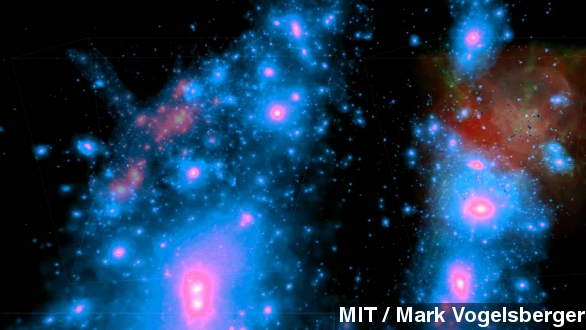There are somewhere around 100 billion galaxies in the observable universe, so it might sound hopeless to try to simulate all of them on a computer. But that hasn't stopped scientists from trying. (Via HubbleSite / NASA / ESA)
Wednesday, a team from MIT unveiled what's being called the most detailed simulation of the universe yet. In just a few minutes, you can watch dark matter and normal matter evolve over billions of years into a universe much like our own. (Via YouTube / Mark Vogelsberger)
The simulation, dubbed Illustris, required enough computing power to keep the average desktop busy for 2,000 years, but the team managed to run it in a few months using multiple supercomputers.
The paper, published in Nature, explains how the team modeled a small-scale universe 330 million light years across in such detail that they could zoom in on individual galaxies. A letter from another astronomer published alongside the paper says, "If this all sounds somewhat complicated, do not be fooled: it is extremely complicated."
A writer for Wired compares the task to "creating a simulation of a person growing up that takes into account the action of every enzyme and DNA strand within their body."
But the result is so good, in a side-by-side comparison with the Hubble image we showed you earlier, it's hard to tell which universe is the real one. The answer is the one on the left, by the way. (Via Illustris Collaboration)
So why go to all the trouble to build a simulated universe? Part of the reason is to test prevailing theories of cosmology and see whether they work in practice.
And a Popular Science article from 2012 says it's also to help solve mysteries. "Scientists hope these models will answer some pressing questions about dark matter, dark energy, and the overall structure of the cosmos."
"It's a big step forward. It's going to be incredibly helpful to cosmologists like me to figure out fundamental properties of the universe." (Via BBC)
Of course, the simulation isn't perfect. The team admits Illustris fudges the details on supermassive black holes, the timing of star formation in early galaxies is a bit off and, of course, it could always be more detailed.
How detailed? Well, keep in mind a number of well-known physicists and philosophers say we can't be sure our own universe isn't a simulation running on someone else's computer. We could be living in the Matrix. Weird thought, huh? (Via YouTube / Tom Campbell, TEDx Talks, Closer ToTruth, Adam Ford)
If you want to play around in the new simulation, the Illustris Project's webpage has a tool that lets you zoom in and explore their universe.


